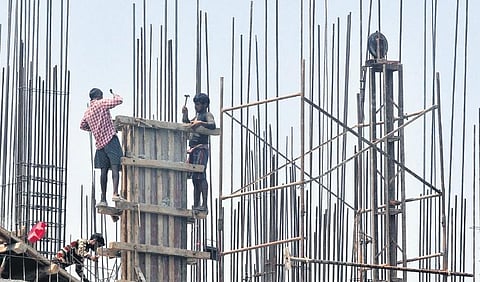

With temperature soaring over 40 degrees Celsius in many parts of the state, the Kerala State Disaster Management Authority has issued a heat stroke alert, urging people to stay indoors and avoid direct exposure to sun.
However, for those who work outdoors to earn a living, following the advisory is not always an option. TNIE speaks to some of these people, who despite the heat and warnings, continue to work outdoors to provide for themselves and their families.
‘Can’t control climate’
Food delivery executive Jobin S A, 25, thanks his good fortune for having escaped from health woes due to the soaring heat. He says some of my colleagues, especially those aged between 45 and 60, have been struggling with the job this season, he says, adding that sunburn and dehydration are common issues.
“This job serves as a source of financial assistance for both students and elderly individuals who work part-time. However, we are compelled to work under any sort of harsh weather condition to meet our daily financial requirements,” says Jobin. “Working under hot conditions can be exhausting, but since we cannot control the climate, we must take care of ourselves. It’s important to take precautions to avoid heat exhaustion or other illnesses.”
‘No luxury of breaks’
Ambu R, a 41-year-old sweeper at the government health centre area, is in a hurry to wrap up work by the time shift ends by about 1pm. “I start at 6am,” he says. “The faster I get the job done, the better.”
Working under the sun — right from about 9am — can be cumbersome to the physical tasks involved and
profuse sweating. “I am a middle-aged man who sweeps the streets,” says Ambu.
“I do not think I have the luxury of taking breaks from the heat. What I can do is complete my work as soon as possible and then seek respite.” Despite the sun’s aggressive heat, Ambu remains committed to his job and goes about stoically pushing his uncomfortably warm metal wheelbarrow along the busy streets. His story is yet another testament to the perseverance of blue-collar workers in the face of challenging working conditions.
‘Dehydration, exhaustion’
“I will receive a salary only if I work, so I have no choice,” says traffic warden P Ushakumari, while on duty at Pattom. “My family depends on my income.” Traffic wardens work in two shifts, she explains. “The morning shift is from 8am to 2pm, while the evening shift is from 2pm to 8pm. The heat becomes severe between 12 noon and 3pm,” she says. “Working at that time is quite taxing.”
Ushakumari adds that she has to carry drinking water with her or buy it from a store. “No one else is going to take care of you,” she says. “Many of us suffer health issues due to the heat wave.” Dehydration and exhaustion are the most common issues. “We are forced to take leave; there were days I could not make it to work due to fatigue,” adds Ushakumari. Traffic wardens are assigned work spots on a daily basis. “It is challenging and stressful, especially under such weather conditions,” says Ushakumari as she continues with her duty. “But we have to cope with it.”
‘Drinking water, please’
A J Sangeetha has been selling lottery tickets in the East Fort area since 2009. Rain or shine, she must get out there, roam the streets so as to eke out a living. Every single day. A licensed vendor, Sangeetha starts sales at 9am and calls it a day by 6pm. She wears a cap and an overcoat for protection against the scorching sun.
“We have been advised not to be exposed to the sun between 11am and 3pm. But I do not have that privilege; keeping off the road at that time will hurt sales,” says the mother of two, who requested not to be photographed. “It would be great if the administration could provide some drinking water or refreshment kiosks in public places, keeping people like me in mind.”
Being the sole breadwinner of her family, Sangeetha’s priority is to sell a maximum number of tickets. “The profit margin is bare minimal; we hardly get enough to make ends meet,” she says. Sangeetha shares that, like many of her fellow vendors, the harsh weather has been taking a toll on her health. But the sales must go on, she smiles.
‘Heat hurts business’
Street vendors face plenty of struggles during summer, including physical discomfort, health risks, and reduced sales. Maari Muthu, a street food vendor who has been selling chaat for 35 years, knows well about the challenges extreme summer heat brings to small businesses like his.
“I’ve seen a lot of people being forced by the local police to move out of the areas with considerable shade along with their stuff. Fortunately, I have not faced such a situation yet,” he says. Maari’s primary concern is not his wellness, but the dipping sales. The Padmanabha Swamy temple, where he operates, is usually a bustling area during midday, but the heat has forced devotees to visit the temple early in the morning, leading to a reduction in sales and income for street vendors. “It’s clear as day that the sales have massively decreased. So I work longer these days so as to make up for the drop in income,” says Maari.
Compiled by Gokul Krishnan V, Romil Udayakumar T N V, Aadil Sirfan & Anush Kumar S